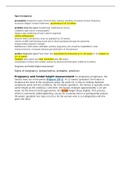CURRICULUM STUDIES
CUS3701
ASSIGNMENT 3
DUE :27 JULY 2023
UNIQUE NO: 751497
,QUESTION 1
The way we interpret the world around us is determined partly by our beliefs,
values and norms, but mostly by contextual influences. The educator’s
interpretation and implementation of a curriculum is also influenced by the
context. Choices regarding planning and designing a learning programme, the
inclusion of particular instructional strategies and the practical application are
embedded in knowledge and the understanding of the educational situation.
Influences ranging from the political, social and economic culture to the norms and
knowledge structures of educators affect teaching and learning. Taking the above
into consideration, critically discuss the following:
1.1 A socio-constructivist’s view (Vygotsky) of the impact of context on curriculum
implementation (7 marks). Do you agree with his view (1 mark)? Justify your
answer (2 marks). (10)
A socio-constructivist's view (Vygotsky) of the impact of context on curriculum
implementation:
According to the socio-constructivist perspective, as advocated by Lev Vygotsky,
context plays a crucial role in curriculum implementation. Vygotsky emphasized the
importance of social interaction and cultural context in the learning process. He
believed that knowledge is not solely acquired through individual cognition but is
constructed through social interactions and cultural tools within a specific context.
In the context of curriculum implementation, Vygotsky's view suggests that educators
should consider the social and cultural aspects of the learning environment. The
curriculum should be designed to create opportunities for meaningful interactions
and collaboration among learners. The inclusion of instructional strategies that
promote social interaction, such as group work, discussions, and peer teaching, can
facilitate the construction of knowledge within the social context.
, Moreover, Vygotsky emphasized the concept of the "zone of proximal development"
(ZPD), which refers to the gap between a learner's current level of knowledge and
their potential level of development with the assistance of more knowledgeable
individuals. In the context of curriculum implementation, educators need to identify
and consider the learners' ZPD to provide appropriate scaffolding and support. By
doing so, educators can help learners move from their current level of understanding
to higher levels of cognitive development.
Vygotsky's socio-constructivist view recognizes that the context in which learning
takes place influences the construction of knowledge and the effectiveness of
curriculum implementation. It highlights the importance of social interaction, cultural
tools, and scaffolding to facilitate learning and development.
Do I agree with Vygotsky's view?
Yes, I agree with Vygotsky's view on the impact of context on curriculum
implementation. Contextual factors, such as the social, cultural, and educational
environment, significantly shape the learning experience and influence the
effectiveness of curriculum implementation.
Firstly, the socio-cultural context provides a framework within which knowledge is
constructed and understood. Students bring their own beliefs, values, and cultural
backgrounds into the learning process. By acknowledging and incorporating these
diverse perspectives, educators can create a more inclusive and meaningful learning
environment.
Secondly, the social interaction and collaboration that occur within the context of
learning are crucial for knowledge construction. Students learn from each other
through dialogue, negotiation, and joint problem-solving. The context influences the
types of interactions and opportunities for collaboration that are available, and
educators should design the curriculum to facilitate these interactions.
Lastly, the educational context, including institutional policies, resources, and
constraints, also shapes the implementation of the curriculum. Educators need to






